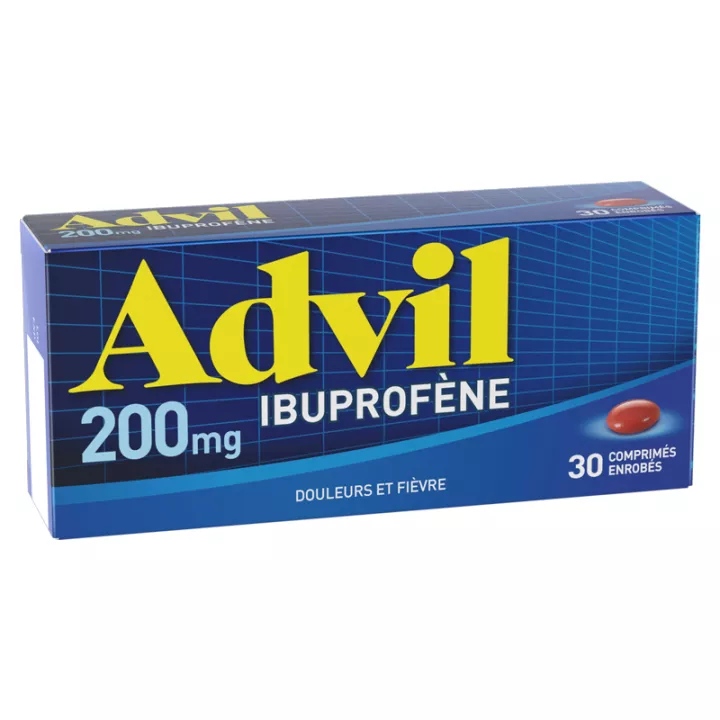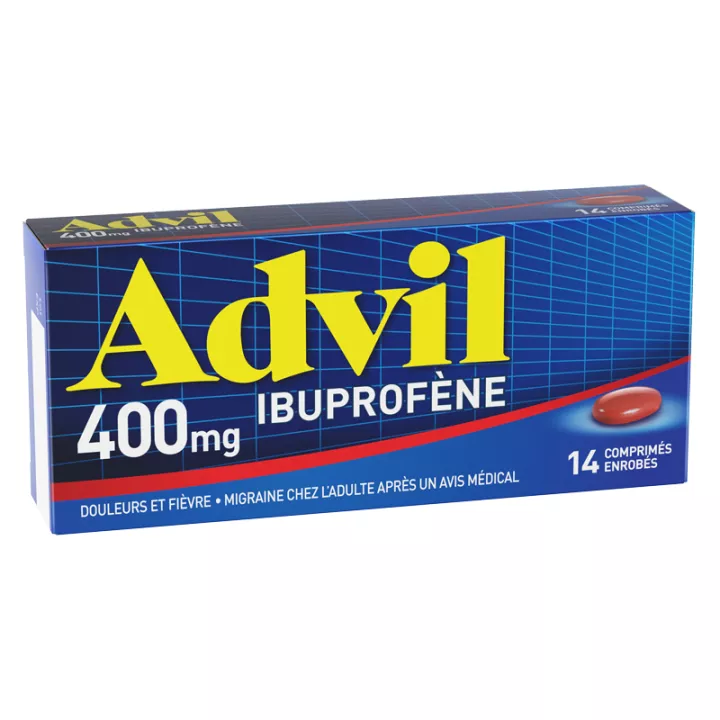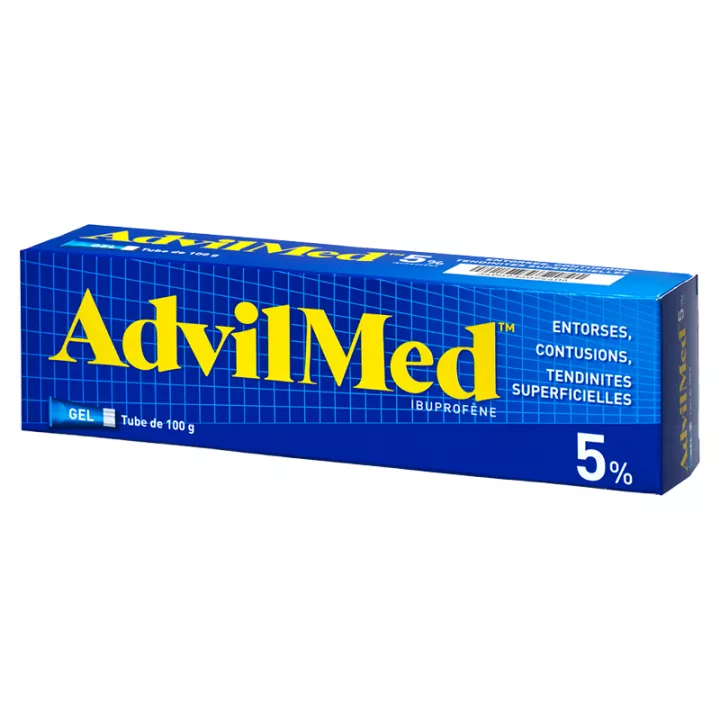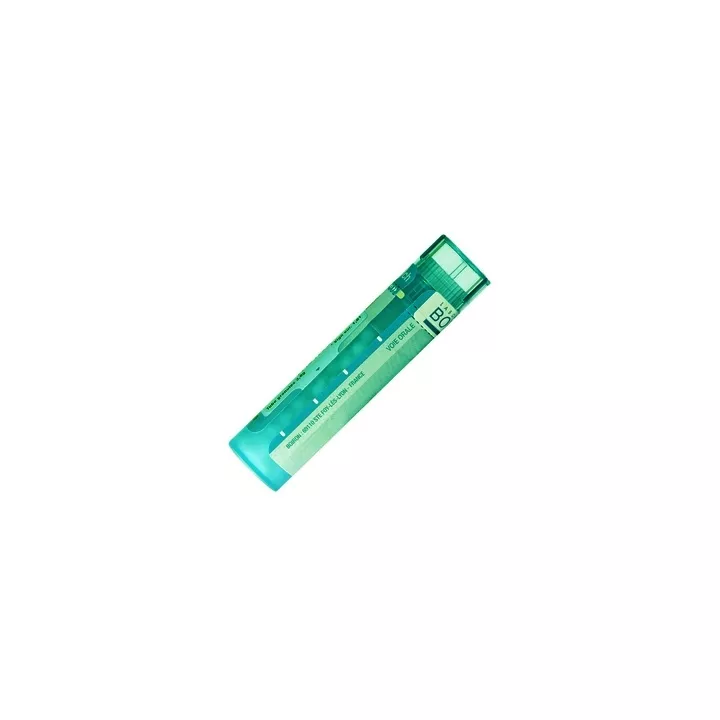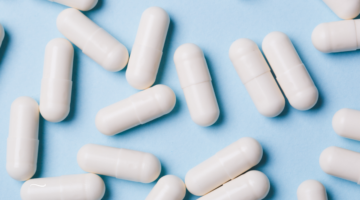NOTICE
ANSM - Last updated: 26/06/2017
Name of the medicinal product
ADVIL 200mg, coated tablet
Ibuprofen
framed
Please read this leaflet carefully before you start taking this medicine because it contains important information for you.
You should always take this medication exactly as prescribed in this leaflet or by your doctor or pharmacist.
· Keep this leaflet. You might need to read it again.
· Ask your pharmacist for advice or information.
· If you experience any side effects, talk to your doctor or pharmacist. This also applies to any side effects not mentioned in this leaflet. See section 4.
· You should contact your doctor if you experience no improvement or feel less well: - after 3 days in child and adolescent, - after 3 days in case of fever and 5 days in case of pain in adults.
What is in this leaflet?
1. What is ADVIL 200mg, coated tablet and in which cases is it used?
2. What should be known before taking ADVIL 200mg, coated tablet?
3. How to take ADVIL 200mg, coated tablet?
4. What are the possible side effects?
5. How to store ADVIL 200mg, coated tablet?
6. Package contents and other information.
1. WHAT IS ADVIL 200mg, coated tablet AND WHAT CASES IS IT USED FOR?
Pharmacotherapeutic group - ATC code: N02B
OTHER ANALGESIC AND ANTIPYRETIC
This medicine contains a non-steroidal anti-inflammatory drug: ibuprofen. In adults and children over 20 kg (about 6 years), it is indicated in the short-term treatment of fever and / or pain such as headache, flu-like conditions, dental pain, aches and pains.
2. BEFORE YOU TAKE ADVIL 200mg, coated tablet?
If your doctor has told you about an intolerance to some sugars, contact your doctor before taking this medicine
Do not take ADVIL 200mg, coated tablet:
· if you are allergic to ibuprofen or to any of the other ingredients of this medication mentioned in section 6.
· after 5 months of pregnancy (24 weeks of amenorrhea),
· if you have a history of allergy or asthma triggered by taking this medication or a related drug, including other non-steroidal anti-inflammatory drugs, acetylsalicylic acid (aspirin),
· if you have a history of gastrointestinal bleeding or ulcers associated with previous NSAID treatments,
· if you have an ulcer or bleeding from the stomach or bowel in progress or recurring,
· if you have gastrointestinal hemorrhage, cerebral hemorrhage or other ongoing hemorrhage,
· history of gastrointestinal ulcer or gastrointestinal haemorrhage,
· if you have severe liver disease,
· if you have a serious kidney disease,
· if you have a serious heart disease,
· if you have systemic lupus erythematosus,
· if you have a child under 6 years old as it can swallow and choke.
IN CASE OF DOUBT, IT IS ESSENTIAL TO ASK FOR THE OPINION OF YOUR DOCTOR OR YOUR PHARMACIST.
Warnings and Precautions
Take special care with ADVIL 200mg, coated tablet:
In high doses, greater than 1200 mg / day, this drug has anti-inflammatory properties and can cause serious disadvantages that are observed with non-steroidal anti-inflammatory drugs.
Drugs such as ADVIL 200mg, coated tablet may increase the risk of heart attack ("myocardial infarction") or stroke. The higher the dose, the greater the risk.
Do not exceed recommended dosage or treatment time.
If you have heart problems including heart failure, angina pectoris (chest pain) or if you have had a heart attack, bypass surgery, lower limb arterial disease (poor circulation due to shrinkage or obstruction arteries), or any type of stroke (including a minor stroke or transient ischemic stroke "TIA") or if you have risk factors for this type of disease (eg high blood pressure, diabetes , high cholesterol, family history of heart disease or stroke or if you smoke), talk to your doctor or pharmacist before taking Advil 200 mg.
Special warnings
If you are a woman, ADVIL 200mg, coated tablet can alter your fertility. Its use is not recommended in women who wish to conceive a child. In women with reproductive difficulties or in which breast function tests are ongoing, please tell your doctor or pharmacist before taking ADVIL 200mg, coated tablet.
Elderly patients have a higher risk of adverse effects, particularly for gastrointestinal haemorrhage, ulcers and perforations. Renal, hepatic and cardiac functions should be closely monitored. The dosage should be as low as possible for the shortest time needed to relieve symptoms.
The use of this medication is not recommended in patients with fructose intolerance, glucose-galactose malabsorption syndrome or sucrase / isomaltase deficiency (rare hereditary diseases).
BEFORE YOU USE THIS MEDICINE, CONSULT YOUR DOCTOR IN CASE:
· a history of asthma associated with chronic rhinitis, chronic sinusitis or polyps in the nose. The administration of this specialty may lead to an asthma attack, especially in some people allergic to acetylsalicylic acid (aspirin) or a non-steroidal anti-inflammatory drug ( see section "Never take ADVIL 200mg, coated tablet in cases below " ),
· coagulation disorders, and anticoagulant therapy. This medication may cause severe gastrointestinal symptoms,
· digestive antecedents (hiatal hernia, digestive hemorrhage, old stomach or duodenal ulcer),
· heart disease, liver (including cirrhosis of the liver) or kidney,
· of varicella. This medication is not recommended because of exceptional severe infections of the skin,
· of non-steroidal anti-inflammatory therapy (NSAID)
· concomitant treatment with other drugs that increase the risk of peptic ulcer or haemorrhage, eg, oral corticosteroids, antidepressants (SSRIs, ie, Selective Serotonin Recapture Inhibitors), medicines preventing the formation of blood clots such as aspirin or anticoagulants such as warfarin. If you are in any of these conditions, talk to your doctor before taking ADVIL 200mg, coated tablet ( see section "Take or use other medicines" ),
· concomitant therapy with methotrexate at doses greater than 20 mg per week or with pemetrexed ( see section "Take or use other medicinal products" ).
· Dehydrated children and adolescents have a risk of kidney failure. Ask your doctor for advice before using ADVIL 200 mg if the child or adolescent has not been drinking fluid or has lost fluid due to continuous vomiting or diarrhea
When administered to the elderly, this drug should be used with caution.
DURING TREATMENT, IN CASE OF:
· of vision problems, PREVENT YOUR DOCTOR,
· gastrointestinal haemorrhage (discharge from the mouth or stool, blood in vomiting, stool coloration in black), STOP TREATMENT AND IMMEDIATELY CONTACT MEDICAL OR EMERGENCY MEDICAL SERVICE,
· onset of severe allergic reaction: redness of the skin, rash, STOP TREATMENT AND IMMEDIATELY CONTACT MEDICAL OR EMERGENCY MEDICAL SERVICE,
· of appearances of cutaneous or mucosal signs that resemble a burn (redness with bubbles or blisters, ulcerations), STOP THE TREATMENT AND CONTACT IMMEDIATELY A DOCTOR OR AN EMERGENCY MEDICAL SERVICE,
· of allergy-related signs including asthma attack or sudden swelling of the face and neck ( see section "What are the possible side effects?" ), STOP TREATMENT AND CONTACT IMMEDIATELY A DOCTOR OR A MEDICAL SERVICE EMERGENCY.
This medicine contains a non-steroidal anti-inflammatory drug: ibuprofen. You should not take other medicines containing non-steroidal anti-inflammatory drugs (including selective cyclooxygenase 2 inhibitors) and / or acetylsalicylic acid (aspirin) at the same time as this medication. Read carefully the instructions for other medicines you are taking to ensure that there are no nonsteroidal anti-inflammatory drugs and / or acetylsalicylic acid (aspirin). |
Talk to your doctor or pharmacist before taking ADVIL 200mg, coated tablet .
Children and Youth
Not applicable.
Other medicines and ADVIL 200mg, coated tablet
Inform your doctor or pharmacist if you are taking, have recently taken or may take any other medicines.
Always tell your doctor, dentist or pharmacist if you are taking or have recently taken any of the following medications in addition to ADVIL 200mg, coated tablet:
· aspirin (acetylsalicylic acid) or other non-steroidal anti-inflammatory drugs
· corticosteroids
· anticoagulant drugs (such as anticoagulants / antiplatelet agents such as aspirin (acetylsalicylic acid), warfarin, ticlopidine, injectable heparin.
· lithium
· methotrexate
· Medicines that reduce blood pressure (angiotensin-converting enzyme inhibitors, such as that captopril, diuretics, beta-blockers such as drugs containing atenolol and angiotensin II antagonists such as losartan)
· some antidepressants (selective serotonin reuptake inhibitors (increased risk of digestive hemorrhage))
· pemetrexed
· ciclosporin, tacrolimus.
· Tenofovir disoproxil
ADVIL 200mg, tablet coated with food and beverages
Not applicable.
Pregnancy and breast feeding
If you are pregnant or breastfeeding, think you may be pregnant or plan a pregnancy, ask your doctor for advice or pharmacist before taking this medication.
Pregnancy
During the first trimester of pregnancy (12 weeks of amenorrhoea, 12 weeks after the first day of your last menstrual period), your doctor may prescribe this medication if necessary.
For 2.5 to 5 months of pregnancy (12 to 24 weeks of amenorrhea), this medication will only be used on the advice of your doctor and in brief dosage. Prolonged use of this medication is strongly discouraged.
After 5 months of pregnancy (beyond 24 weeks of amenorrhea), you should NOT take this medication because its effects on your child can have serious consequences, especially on a cardiopulmonary level and renal, even with a single dose.
If you are taking this medication when you are more than five months pregnant, please speak to your obstetrician gynecologist for appropriate monitoring.
feeding
This drug passes into breast milk. As a precaution, it should be avoided during breastfeeding
Driving and using machines
In rare cases, taking this medicine may cause dizziness and blurred vision
ADVIL 200mg, coated tablet contains sucrose.
3. HOW TO TAKE ADVIL 200mg, coated tablet?
Always take this medication exactly as prescribed by your doctor or pharmacist. Check with your doctor or pharmacist if you are not sure.
The occurrence of adverse reactions can be minimized by using the lowest possible dose for the shortest duration necessary to alleviate the symptoms.
Dosage
ADULT TO ADULT AND CHILD FROM 20 kg (about 6 years).
Painful and / or febrile conditions
In children, the usual dosage is 20 to 30 mg / kg / day in 3 doses per day (not to exceed 30 mg / kg / day).
In children from 20 to 30 kg (approximately 6 to 11 years): 1 tablet (200 mg), to be renewed if necessary after 6 hours. In all cases, do not exceed 3 tablets per day (600 mg).
In adults and children over 30 kg (approximately 11-12 years): 1 to 2 tablets (200 mg to 400 mg), to be renewed if necessary after 6 hours. In all cases, do not exceed 6 tablets per day (1200mg).
The elderly with an increased risk of adverse effects should use the lowest possible dose for the shortest time necessary to relieve symptoms.
Do not exceed the recommended doses or the duration of treatment (3 days in case of fever, 5 days in case of pain).
The maximum dosage is 6 tablets per day (1200 mg).
Always take this medication exactly as prescribed in this leaflet or as directed by your doctor or pharmacist. Check with your doctor or pharmacist if in doubt.
Administration mode
Oral use.
Swallow the tablet without chewing it with a large glass of water.
The tablets should be taken preferably during a meal
Frequency of Administration
Systematic catches help to avoid oscillations of pain or fever.
They should be spaced at least 6 hours.
Duration of treatment
In children and adolescents, if this medication is needed for more than 3 days, or if the symptoms worsen, it is advisable to consult your doctor.
In adults, the duration of use is limited to: · 3 days in case of fever, · 5 days in case of pain. |
In adults if pain persists for more than 5 days or fever for more than 3 days, or if they worsen or if another disorder occurs, inform your doctor.
If you feel that the effect of ADVIL 200 mg coated tablet is too strong or too weak, talk to your doctor or pharmacist.
If you take more ADVIL 200mg, coated tablet than you should
In case of accidental overdose or poisoning, STOP TREATMENT AND QUICKLY CONSULT A DOCTOR OR AN EMERGENCY MEDICAL SERVICE.
Symptoms of overdose include: dizziness, abdominal pain, nausea, vomiting, dizziness, drowsiness, headache, convulsions, loss of consciousness, difficulty breathing ("dyspnea" ), respiratory depression, abnormal blood pressure decline ("hypotension"), renal insufficiency, abnormally high blood acidity ("metabolic acidosis"), abnormal increase in blood potassium ("hyperkalaemia"), abnormal blood liver function.
If you forget to take ADVIL 200mg, coated tablet
Do not take a double dose to make up for a missed dose.
If you stop taking ADVIL 200mg, coated tablet
Not applicable.
If you have any further questions on the use of this medication, ask your doctor or pharmacist
4. WHAT ARE POSSIBLE SIDE EFFECTS?
Like all medicines, this medicine may cause side effects, although not everybody gets them.
Medications such as ADVIL 200mg, coated tablet may increase the risk of heart attack (myocardial infarction), angina pectoris or stroke.
May cause allergic reactions:
· (rash, maculopapular rash, erythema multiforme, purpura), itching ("pruritus"), edema, aggravation of chronic urticaria, edema of the face,
· respiratory distress, asthma attacks, respiratory discomfort ("bronchospasm"), wheezing or difficult breathing ("dyspnea")
· generalized: sudden swelling of the face and neck with respiratory discomfort (angioedema), anaphylactic reaction, hypersensitivity reaction.
In rare cases, bleeding, gastrointestinal perforation or digestive ulceration (abdominal pain, high abdominal pain, blood rejection by the mouth ("hematemesis") or stools, stool coloration ("melaena"), exacerbation of inflammation of the bowel ("colitis") or Crohn's disease (see section "Take special precautions with ADVIL 200mg, coated tablet"). These are all the more frequent because the dosage used is high.
Exceptionally, headaches accompanied by nausea, vomiting and neck stiffness can be observed: symptoms of meningitis.
Extremely bubbling of the skin or mucous membranes (burning sensation accompanied by redness with bubbles, blisters, ulcers (Lyell Syndrome and Stevens-Johnson Syndrome) may occur.
Exceptionally, severe skin infections have been observed in cases of chicken pox.
In all these cases, you should stop treatment immediately and notify your doctor .
During treatment, there may be:
· stomach upset, vomiting, nausea, diarrhea, constipation, flatulence, difficult digestion (dyspepsis), abdominal distension, gastritis,
· dizziness, dizziness, headache, rare visual disturbances, significant decrease in urine, abnormal blood in the urine ("hematuria") and protein in the urine ("proteinuria"), kidney failure, and other kidney diseases ("interstitial nephritis", "nephrotic syndrome", "papillary necrosis").
In all these cases, you should tell your doctor .
Exceptionally, changes have been observed in the liver function or blood count (abnormal decrease in blood cell count: white cells ("agranulocytosis", "leukopenia") or red blood cells ("anemia", "aplastic anemia" "Hemolytic anemia", decreased hematocrit and hemoglobin) or platelets ("thrombocytopenia") may be severe.
Other very rare adverse reactions:
· nervousness, ringing of ears,
· mouth ulcers,
· abnormally high blood pressure ("hypertension"),
· heart failure,
· liver problems: symptoms may include yellowing of the skin and whites of the eyes ("jaundice"), hepatitis,
· peripheral edema, swelling.
Declaration of side effects
If you experience any side effects, talk to your doctor or pharmacist. This also applies to any side effects not mentioned in this leaflet. You can also report adverse reactions directly via the national reporting system: National Agency for the Safety of Medicines and Health Products (ANSM) and network of Regional Centers of Pharmacovigilance - Website: www.ansm.sante.fr
By reporting adverse reactions, you are helping to provide more information about the safety of the drug.
5. HOW TO STORE ADVIL 200mg, coated tablet?
Keep this medicine out of the reach and sight of children.
Do not use this medicine after the expiry date which is stated on the package. The expiry date refers to the last day of that month.
This medication should be stored at room temperature (10-25 ° C).
Do not throw any medicines into drains or rubbish. Ask your pharmacist to remove any medications you are no longer using. These measures will help protect the environment.
6. PACKAGE CONTENTS AND OTHER INFORMATION
What ADVIL 200mg contains, coated tablet
· The active substance is:
Ibuprofen................................................. .................................................. 200 mg
· The other components are: corn starch, pregelatinized starch, anhydrous colloidal silica, stearic acid. sucrose, oxidized potato starch (Perfectamyl gel 45), povidone, polysorbate 80, macrogol 6000, titanium dioxide (E171), calcium carbonate, talc, carnauba wax, red iron oxide (E172), black ink Opacode S-1-17823 (shellac, black iron oxide (E172), N-butyl alcohol, purified water, propylene glycol, isopropyl alcohol, ammonium hydroxide).
What is ADVIL 200mg, coated tablet and contents of the pack
This medication is in the form of a coated tablet. Box of 20 or 30
Not all pack sizes may be marketed.
Marketing Authorization Holder
PFIZER FAMILY HEALTH
23-25, AVENUE OF DOCTOR LANNELONGUE
75014 PARIS
Marketing Authorization Operator
PFIZER FAMILY HEALTH
23-25, AVENUE OF DOCTOR LANNELONGUE
75014 PARIS
Maker
PFIZER CONSUMER MANUFACTURING ITALY SRL
VIA NETTUNENSE, 90
04011 APRILIA - LT
ITALY
Names of the medicinal product in the Member States of the European Economic Area
Not applicable.
The last date on which this leaflet was revised is:
[to be completed later by the holder]
<{MM / YYYY}> <{YYYY month}.>
Other
Detailed information on this medicine is available on the ANSM website (France).
Health Education Council:
"WHAT TO DO IN THE EVENT OF FEVER":
The normal temperature of the body is variable from one individual to another and between 36.5 ° C and 37.5 ° C. An increase of more than 0.8 ° C is considered a fever.
In adults and children over 20 kg (approx. 6 years): If the disorder is too troublesome, you can take a medicine containing ibuprofen at the indicated dosage.
With this medication, the fever should drop rapidly. Nevertheless :
· if other signs appear (such as a rash),
· if the fever persists for more than 3 days or if it worsens,
· if the headache becomes violent, or in case of vomiting,
CONSULT YOUR DOCTOR IMMEDIATELY.
"WHAT TO DO IN CASE OF PAIN":
· In the absence of improvement after 5 days of treatment,
· If the pain returns regularly,
· If accompanied by fever,
· If she wakes you up at night,
CONSULT YOUR DOCTOR IMMEDIATELY

